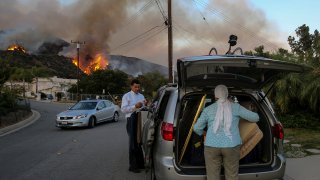
Residents evacuate their home as a wildfire is burning along a hillside in Duarte, Calif., Monday, June 20, 2016. Police in the city of Azusa and parts of Duarte ordered hundreds of homes evacuated. Others were under voluntary evacuations. (AP Photo/Ringo H.W. Chiu)
Southern California is facing triple-digit heat this weekend and heightened concerns about the rapid spread of brush fires.
Residents should be prepared and have plans set in place.
If by chance you are near a wildfire, you may be asked to evacuate. Here are some things you should know if you find yourself in that situation:
When should I leave?
It is wise to leave the area as soon as an evacuation is recommended. This will help you avoid being caught in a fire, smoke or traffic. This will also help firefighters keep roads clear, which allows them to work without obstacles.
Where should I go?
Call your friends or family who live outside the threatened area and see if they can offer you a place to stay during the evacuation. Your local fire department or city officials will also have designated evacuation shelters.
What should I take with me?
Prepare an emergency kit well before a fire strikes. This kit should include things like a first aid kit, a three-day supply of non-perishable food and three gallons of water per person, spare keys and cash and medication. If time allows, then you should pack easily carried valuables, chargers for your cell phones and laptops, and anything irreplaceable such as family photos.
What about my cat, dog, bird, lizard, etc.?
Ask friends and family if they can shelter your animals during an emergency. Keep a list of 24-hour numbers for pet-friendly places such as animal shelters, pet boarding facilities and veterinarians.
What should I wear?
If you need to go outside while there is an active fire nearby, put on some protective clothing like sturdy shoes, cotton or woolen clothes, long pants, a long-sleeved shirt and gloves.
Sam DiGiovanna is a 35-year fire service veteran. He started with the Los Angeles County Fire Department, served as Fire Chief at the Monrovia Fire Department and currently serves as Chief at the Verdugo Fire Academy in Glendale.